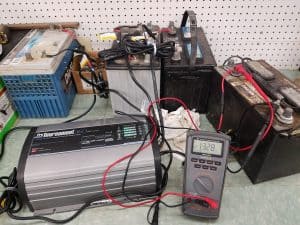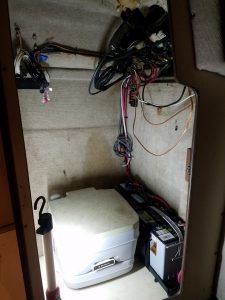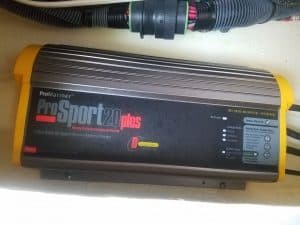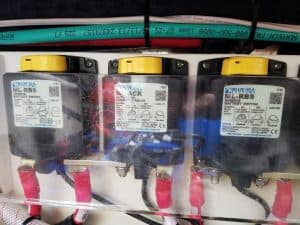Storing your boat’s batteries for the winter is crucial to their lifespan. Boat batteries can get extremely expensive, so getting the most out of them is really important for your wallet!
How To Store Boat Batteries For The Winter! You should disconnect your boat’s batteries and store them in a warm dry location out of the weather. In the garage in a clean area, hooking them up to a trickle charger occasionally throughout the winter months.
Reading this will teach you how to properly disconnect and store your boat batteries for the winter to ensure that you get the most life out of them!
Should You Remove A Boat Battery In The Winter?
 When you decide to store your boat away for the winter, it is a good idea to remove the battery first. Boat batteries can be extremely expensive. If you want to get your money’s worth out of your batteries. You must take proper care of them to extend their lifespan.
When you decide to store your boat away for the winter, it is a good idea to remove the battery first. Boat batteries can be extremely expensive. If you want to get your money’s worth out of your batteries. You must take proper care of them to extend their lifespan.
Since you would not be using the boat battery throughout the winter. You must not let it drain out and die. Keeping a battery at extremely low levels or fully discharged over long periods of time, can degrade their lifespan.
In the winters, discharged batteries can also freeze over. The water inside the battery expands when frozen, and damages the battery. This can cause deformation, cracks, and leaks inside the battery body.
For more in-depth information on a freezing battery, check out our article here on Whether Boat Batteries Can Freeze Or Get Wet!
You do not want to take your boat out of storage just to discover that your brand new battery is dead. There is nothing worse than a dead battery to spoil your day when you plan to spend it out on the water.
Putting in a new battery would be an expensive and time-consuming task. You might even have the knowledge and skill to revive the dead battery again and use it. However, this also requires time that you would much rather spend on the water.
Thus, it is important that you remove your boat battery before you put the boat in storage. To prevent it from freezing over in the winter, keep the battery charged through the winter. It is a good idea to place it in a cool place that does not fall below freezing temperatures.
Should I Disconnect My Boat Battery?
In case you do not have extremely cold winters in your region, you might decide to leave the battery inside your boat. Rather than breaking your back trying to get the battery off of the boat. You might think the temperatures are reasonable enough to let the battery sit inside the boat.
We do not recommend this practice, as it is better to be safe than sorry. Keeping your boat battery inside where it is slightly warmer can spell the difference between life and death for a battery.
However, if you do decide to leave the battery in, you must disconnect it before storing your boat away for the winters. Even if you double-checked that all electronics are off and there is no load on the battery, you can end up discharging it if you leave it plugged in.
This is because electronics have parasitic “phantom” loads. Even when they are not turned off. Some may draw a small amount of electric power from the battery. Over an entire winter season, these can draw considerable power from your battery.
These phantom loads, coupled with the self-discharge of a battery, can drain the battery out of charge. As the battery power levels fall, so do their resistance to freezing over.
This is so important that we have another dedicated article to show you How To Keep Your Boat Battry From Continuously Dying On You!
In the worst-case scenario, your battery level can fall to a level low enough that the temperature causes it to freeze over. This can permanently damage your boat battery.
Therefore, it is extremely important that you at least disconnect the boat battery if you decide to leave it on the boat for the winters. Taking this small step can increase the longevity of your battery.
When you reconnect the battery again in the spring, you would not have to hear the dreaded silence as you try to turn the engine on.
How To Safely Disconnect The Battery:
You must take proper steps to ensure your safety and preserve the lifespan of your battery when attempting to remove it. Charged batteries can deliver powerful electric shocks, so it is important that you should be careful when handling them.
Open the battery compartment and check the battery for acid leaks and corrosion. Pay special attention to the terminals, as these attract the most corrosion and build-ups. Gently clean the leaks and build-up using a soft cloth. Clean the cables of any corrosion they might have.
Then, disconnect the black cable first from the battery. The black cable is the negative terminal of the battery. Removing the cable might require additional tools such as a wrench or pliers, depending on your battery model.
Take extreme care while disconnecting the cable. And make sure that you do not – under any circumstance – let the black cable come into contact with the red one!
Even if your wrench comes into contact with both the red and black terminals, it can lead to a short circuit. This can cause serious injury to you as well as seriously damage your battery at the same time.
As well as possibly damage expensive engine computers and electronics!
 After you remove the black cable and carefully set it away, it is time to remove the red one from the battery. Do so carefully, and avoid touching the terminals with your bare hands or with a conducting material (such as metal).
After you remove the black cable and carefully set it away, it is time to remove the red one from the battery. Do so carefully, and avoid touching the terminals with your bare hands or with a conducting material (such as metal).
There, you have successfully disconnected the battery. Make sure to stow the cables carefully away so that they do not accidentally come into contact with the terminals.
You will also want to take a zip tie and strap the two different sets of cables together. To make it easier when it comes time to put the battery back in! This will help to avoid leaving on cable off.
Additionally, cover the terminals up with an insulating material. Many batteries come with rubber covers for the terminals to prevent short circuits and accidental electrocution.
How To Safely Reconnect The Battery:
Reconnecting the battery safely follows essentially the same steps as disconnecting it. The only difference is that the steps follow a reverse order.
Carefully inspect the battery to ensure that it does not show signs of physical damage. Any leaks, corrosion, distortion, or swells on the body may indicate damage to the battery.
With extreme caution, attach the red cable to the positive terminal on your battery. Make sure not to wire the boat up the wrong way, as it can cause damage to the electronics as well as your battery.
Secure the connection so that the cable does not slip away from the terminal. Wind the wires, and tighten the nuts on the terminal if they exist.
Taking care not to cause a short circuit, attach the black cable to the negative terminal. Then, secure it as well.
There! You have safely reconnected your battery to your boat. Time to try the ignition and see if the engine turns over!
Where To Store The Battery During The Winter
 When you store your boat away for the winters, disconnect your battery and take it inside. Store it in a slightly warmer environment, but make sure it is dry to increase the lifespan of your battery.
When you store your boat away for the winters, disconnect your battery and take it inside. Store it in a slightly warmer environment, but make sure it is dry to increase the lifespan of your battery.
If you live in an extremely cold area where the weather falls well below freezing point, you might have to take extra measures to preserve battery life. You might want to invest in tools such as battery blankets that keep the battery warm through the winters.
Wherever you decide to store your battery, it is important that you keep it in a safe place. Cover up the terminals, and keep the battery away from the reach of children. Remember, a charged battery is a dangerous thing.
Should I Leave My Boat Battery Charger On All The Time?
It is important to maintain the charge level of your boat battery to prevent it from freezing over. Even if the temperatures are not low enough for the electrolytes to freeze, you must not allow your battery to discharge fully.
 A battery that sits in a discharged state for a long period of time will fall in its charge capacity. In some cases, the battery may even completely die out. Therefore, you should make sure that your battery is at a reasonable charge level.
A battery that sits in a discharged state for a long period of time will fall in its charge capacity. In some cases, the battery may even completely die out. Therefore, you should make sure that your battery is at a reasonable charge level.
Some people prefer to leave their boat battery charger plugged in all of the time. However, using any old charger for this purpose can actually overcharge and damage the battery, instead of protecting it.
If you want to leave your charger plugged in all the time, make sure that you use a smart trickle charger. This is a special type of charger that prevents overcharging your battery while maintaining the charge level.
However, using a trickle charger to keep the battery charged all the time is not absolutely necessary. You only need to take care not to let the battery level fall too low.
Check the battery level occasionally and charge it as it falls to a low charge level. It is enough to check the battery level just once a weekf.
You can even get by checking it once every two weeks or once a month. Just remember to maintain the battery level and charge it when it falls too low.
Maintaining Deep Cycle Batteries Over the Winter
A deep cycle battery is designed to undergo extreme discharge levels throughout regular use. Keeping it fully charged all of the time using a trickle charger is a bad idea, and can actually decrease its lifespan.
If you have a deep cycle battery, let it sit inside your house until it has an extremely low charge level. Keep checking the levels every week, but do not do anything until it discharges completely.
Once the battery is almost out of any charge, plug it in to the charger. Charge it up to the maximum level, then let it sit again. Repeat this cycle to ensure the longevity of your battery.
Check Us Out!
Now that you know all about storing your boat’s batteries during the winter. Here are a few more articles that you will find extremely helpful and informational!
How Long Do Boat Batteries Last? And How to Make Them Last Longer!
Can Boats Be Stored Outside In The Winter? Yes or No?
Can Boat Batteries Get Wet or Freeze?
We’d also like to invite you to check us out on Our YouTube Channel! We create all kinds of How-To and DIY boating videos to help you learn more and more about your boat and how it works!
